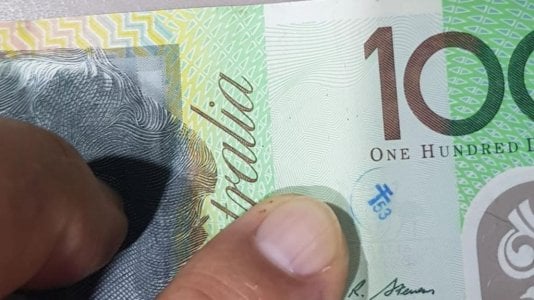Aussie reveals hidden flaw on $100 note that could make yours worthless: ‘You have to be very careful’
By
Seia Ibanez
- Replies 6
Travelling abroad can be an exciting adventure, filled with new experiences and memories to last a lifetime.
However, it's the little things that can sometimes trip us up, like the currency we carry in our wallets.
A recent incident involving an Australian traveller has highlighted a crucial detail that many of us might overlook when handling cash—a detail that could render our money worthless overseas.
The traveller's tale began when he attempted to exchange an Australian $100 note for local currency in Thailand.
To his dismay, the banknote was ‘rejected’ due to a small, easy-to-miss blue stamp located just below the words 'one hundred’.
Accompanying his story, the man posted a photo on social media showing the stamp, which included a symbol and the number 53.
'Went to exchange Australian currency for Thai baht in Thailand, and they rejected this note because of this little blue stamp. Any got any idea why?’ he wrote, seeking insight from fellow social media users on why this might have happened.
The post quickly sparked a flurry of reactions and an intense online debate.
Some commenters criticised the man for spending his money abroad, saying, ‘You could try [going on a holiday] in Australia and keeping money in Australia instead of spending money overseas!’
Another said, ‘One more reason not to go to Thailand!’
Others shared their own experiences and knowledge, pointing out that the stamp likely came from ‘a currency exchange point’ and warning others to be vigilant about similar markings.
‘Yeah, you have to be very careful in Thailand—they will not accept if there is any writing on the note or if it is slightly torn, one said.
Sometimes, even too crumpled, they won’t accept, it is pretty standard there.’
‘However, you can go from shop to shop, trying your luck till someone doesn’t notice/care. But yeah, this is normal for Thailand, I am sorry to say.’
'Only clean, undamaged new notes will be exchanged. Always check the notes in Australia before you leave,' advised one commenter.
‘Any marks, ink, tears they won’t take—I check every note before I go, or it’s useless, been caught before,’ another said.
‘As if we haven’t got enough troubles using our own cash in our own country,’ a third responded.
A fourth commented, ‘Cash is legal tender, use it.’
 Do you have tips on handling cash while travelling? Share them with us in the comments below!
Do you have tips on handling cash while travelling? Share them with us in the comments below!
However, it's the little things that can sometimes trip us up, like the currency we carry in our wallets.
A recent incident involving an Australian traveller has highlighted a crucial detail that many of us might overlook when handling cash—a detail that could render our money worthless overseas.
The traveller's tale began when he attempted to exchange an Australian $100 note for local currency in Thailand.
To his dismay, the banknote was ‘rejected’ due to a small, easy-to-miss blue stamp located just below the words 'one hundred’.
Accompanying his story, the man posted a photo on social media showing the stamp, which included a symbol and the number 53.
'Went to exchange Australian currency for Thai baht in Thailand, and they rejected this note because of this little blue stamp. Any got any idea why?’ he wrote, seeking insight from fellow social media users on why this might have happened.
The post quickly sparked a flurry of reactions and an intense online debate.
Some commenters criticised the man for spending his money abroad, saying, ‘You could try [going on a holiday] in Australia and keeping money in Australia instead of spending money overseas!’
Another said, ‘One more reason not to go to Thailand!’
Others shared their own experiences and knowledge, pointing out that the stamp likely came from ‘a currency exchange point’ and warning others to be vigilant about similar markings.
‘Yeah, you have to be very careful in Thailand—they will not accept if there is any writing on the note or if it is slightly torn, one said.
Sometimes, even too crumpled, they won’t accept, it is pretty standard there.’
‘However, you can go from shop to shop, trying your luck till someone doesn’t notice/care. But yeah, this is normal for Thailand, I am sorry to say.’
'Only clean, undamaged new notes will be exchanged. Always check the notes in Australia before you leave,' advised one commenter.
‘Any marks, ink, tears they won’t take—I check every note before I go, or it’s useless, been caught before,’ another said.
‘As if we haven’t got enough troubles using our own cash in our own country,’ a third responded.
A fourth commented, ‘Cash is legal tender, use it.’
Key Takeaways
- An Australian traveller shared his experience of a $100 note being rejected in Thailand due to a small blue stamp.
- The stamp, found below the words 'one hundred', led to debate and warnings among social media users.
- Many advised being cautious as marked, torn, or overly crumpled Australian currency might not be accepted in foreign countries.
- Some responses highlighted the challenges of using cash abroad and stressed checking notes before travelling to ensure they are clean and undamaged.








